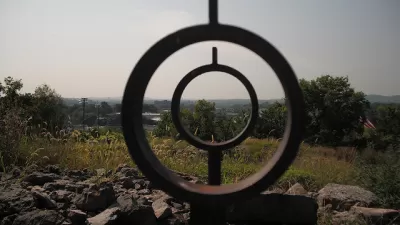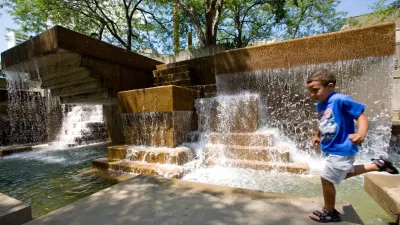The Cultural Landscape Foundation last week announced the creation of an international landscape architecture price, to be awarded for the first time in 2021.

The Cultural landscape Foundation will offer $100,000 to the winner of a biennial landscape architecture prize, according to a press release.
In addition to the cash prize, "the Prize features two years of related public engagement activities to honor a living practitioner, collaborative or team for their creative, courageous, and visionary work in the field of landscape architecture," according to the release.
The $100,000 prize is made possible by a donation from TCLF board co-chair Joan Shafran and her husband Rob Haimes. The lead gift of US$1 million to underwrite the Prize was collectively matched by the rest of the board and other donors, launching a US$4.5 million fundraising campaign to endow the prize in perpetuity.
The first prize will be awarded in 2021, with a prize committee already appointed to select the inaugural prize winner. "The Prize will examine the state of landscape architecture through the honoree’s practice, showcasing how landscape architecture and its practitioners are transforming the public realm by addressing social, ecological, cultural, environmental, and other challenges in their work," according to the release.
The Cultural Landscape Foundation has also launched a website in connection with the announcement, sharing the press release along with a number of other pages to provide more background on the prize and its raison d'être. There's even a page that imagines who might have won the prize if it had existed 50 years ago.
FULL STORY: The Cultural Landscape Foundation Establishes New International Landscape Architecture Prize

Trump Administration Could Effectively End Housing Voucher Program
Federal officials are eyeing major cuts to the Section 8 program that helps millions of low-income households pay rent.

Planetizen Federal Action Tracker
A weekly monitor of how Trump’s orders and actions are impacting planners and planning in America.

Ken Jennings Launches Transit Web Series
The Jeopardy champ wants you to ride public transit.

Washington Legislature Passes Rent Increase Cap
A bill that caps rent increases at 7 percent plus inflation is headed to the governor’s desk.

From Planning to Action: How LA County Is Rethinking Climate Resilience
Chief Sustainability Officer Rita Kampalath outlines the County’s shift from planning to implementation in its climate resilience efforts, emphasizing cross-departmental coordination, updated recovery strategies, and the need for flexible funding.

New Mexico Aging Department Commits to Helping Seniors Age ‘In Place’ and ‘Autonomously’ in New Draft Plan
As New Mexico’s population of seniors continues to grow, the state’s aging department is proposing expanded initiatives to help seniors maintain their autonomy while also supporting family caregivers.
Urban Design for Planners 1: Software Tools
This six-course series explores essential urban design concepts using open source software and equips planners with the tools they need to participate fully in the urban design process.
Planning for Universal Design
Learn the tools for implementing Universal Design in planning regulations.
Heyer Gruel & Associates PA
Ada County Highway District
Institute for Housing and Urban Development Studies (IHS)
City of Grandview
Harvard GSD Executive Education
Toledo-Lucas County Plan Commissions
Salt Lake City
NYU Wagner Graduate School of Public Service




























